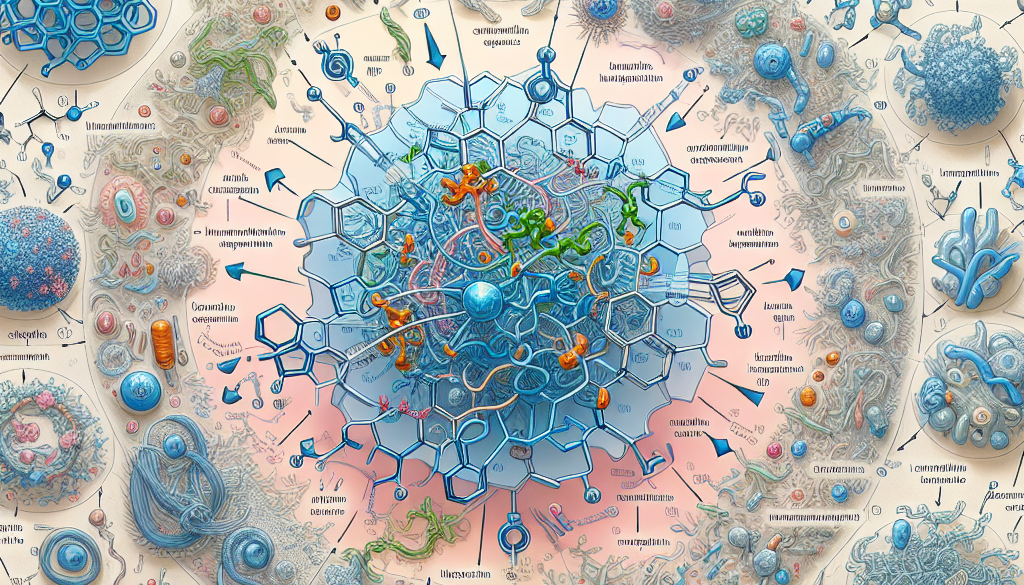Acacetin Immunomodulation Effects and Mechanisms
-
Table of Contents
- Acacetin Immunomodulation Effects: Unveiling the Mechanisms
- Understanding Acacetin
- Immunomodulation by Acacetin: The Science
- Anti-inflammatory Effects
- Modulation of Immune Cell Function
- Regulation of Immune Signaling Pathways
- Research Highlights and Case Studies
- Case Study: Acacetin in Allergic Responses
- Case Study: Acacetin in Sepsis
- Implications for Human Health
- Conclusion: The Future of Acacetin in Immunotherapy
- Discover ETchem’s Protein Products
Acacetin Immunomodulation Effects: Unveiling the Mechanisms

Acacetin, a naturally occurring flavonoid found in various plants, has garnered significant attention in the scientific community for its potential health benefits. Among its various biological activities, the immunomodulatory effects of acacetin stand out as particularly promising for therapeutic applications. This article delves into the mechanisms behind acacetin’s influence on the immune system and explores the potential implications for human health.
Understanding Acacetin
Acacetin is a flavone, a type of flavonoid, which is a class of compounds known for their antioxidant properties. It is primarily found in the damiana plant (Turnera diffusa) and is also present in other plant species such as the Robinia pseudoacacia and Chrysanthemum morifolium. Flavonoids like acacetin are known for their ability to modulate various biological processes, including those related to the immune system.
Immunomodulation by Acacetin: The Science
Immunomodulation refers to the alteration of the immune response, which can be either stimulation or suppression, depending on the desired therapeutic outcome. Acacetin has been shown to exhibit both immunostimulatory and immunosuppressive activities, making it a compound of interest for treating a range of immune-related conditions.
Anti-inflammatory Effects
One of the key aspects of acacetin’s immunomodulatory effects is its anti-inflammatory properties. Inflammation is a natural immune response to injury or infection, but chronic inflammation can lead to various diseases. Acacetin has been found to inhibit the production of pro-inflammatory cytokines, which are signaling molecules that promote inflammation. By reducing the levels of these cytokines, acacetin can potentially alleviate inflammatory conditions.
Modulation of Immune Cell Function
Acacetin also affects the function of various immune cells. For example, it can influence the activity of macrophages, which are cells that play a crucial role in the immune response by engulfing pathogens and presenting antigens to T cells. Acacetin has been shown to enhance the phagocytic activity of macrophages, thereby boosting the body’s ability to fight off infections.
Regulation of Immune Signaling Pathways
At the molecular level, acacetin modulates several signaling pathways that are critical for immune cell function. These include the NF-κB pathway, which is involved in the expression of genes related to the immune response and inflammation. By modulating this pathway, acacetin can influence the overall behavior of the immune system.
Research Highlights and Case Studies
Several studies have highlighted the potential of acacetin as an immunomodulatory agent. For instance, research has shown that acacetin can suppress the production of inflammatory mediators in animal models of asthma, suggesting its potential as a treatment for allergic inflammatory diseases. Additionally, acacetin has demonstrated protective effects in models of sepsis, a severe and often fatal immune response to infection.
Case Study: Acacetin in Allergic Responses
In a study examining the effects of acacetin on allergic airway inflammation, mice treated with acacetin showed reduced infiltration of eosinophils, a type of white blood cell associated with allergic reactions, into the lungs. This was accompanied by lower levels of IgE, an antibody that plays a key role in allergies, indicating that acacetin may help mitigate allergic responses.
Case Study: Acacetin in Sepsis
Another study investigated the role of acacetin in a mouse model of sepsis. The results indicated that acacetin treatment improved survival rates and reduced the levels of systemic inflammatory cytokines. These findings suggest that acacetin could be a valuable therapeutic agent in managing sepsis by modulating the immune response.
Implications for Human Health
The immunomodulatory effects of acacetin have significant implications for human health. By modulating the immune response, acacetin could potentially be used to treat a variety of immune-related diseases, including autoimmune disorders, allergies, and even cancer. However, further research is needed to fully understand its mechanisms and to translate these findings into clinical applications.
Conclusion: The Future of Acacetin in Immunotherapy
Acacetin’s immunomodulatory effects offer a promising avenue for the development of new immunotherapies. Its ability to both stimulate and suppress the immune response, depending on the context, makes it a versatile compound with potential applications in treating a wide range of immune-related conditions. As research continues to unravel the mechanisms behind acacetin’s effects on the immune system, we may see it emerge as a key player in the field of immunotherapy.
Discover ETchem’s Protein Products
For those interested in exploring the benefits of proteins in health and wellness, ETchem’s protein products are an excellent resource. ETchem offers a variety of high-quality collagen products, including marine, fish, bovine, chicken, and different types of collagen, suitable for various industries. Their products are characterized by neutral taste and instant solubility, making them ideal for nutraceutical, pharmaceutical, cosmeceutical, and food and beverage applications.
About ETChem:
ETChem, a reputable Chinese Collagen factory manufacturer and supplier, is renowned for producing, stocking, exporting, and delivering the highest quality collagens. They include marine collagen, fish collagen, bovine collagen, chicken collagen, type I collagen, type II collagen and type III collagen etc. Their offerings, characterized by a neutral taste, instant solubility attributes, cater to a diverse range of industries. They serve nutraceutical, pharmaceutical, cosmeceutical, veterinary, as well as food and beverage finished product distributors, traders, and manufacturers across Europe, USA, Canada, Australia, Thailand, Japan, Korea, Brazil, and Chile, among others.
ETChem specialization includes exporting and delivering tailor-made collagen powder and finished collagen nutritional supplements. Their extensive product range covers sectors like Food and Beverage, Sports Nutrition, Weight Management, Dietary Supplements, Health and Wellness Products, ensuring comprehensive solutions to meet all your protein needs.
As a trusted company by leading global food and beverage brands and Fortune 500 companies, ETChem reinforces China’s reputation in the global arena. For more information or to sample their products, please contact them and email karen(at)et-chem.com today.




